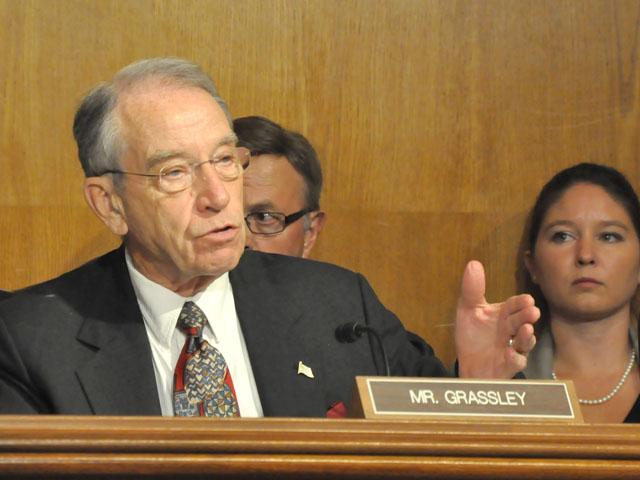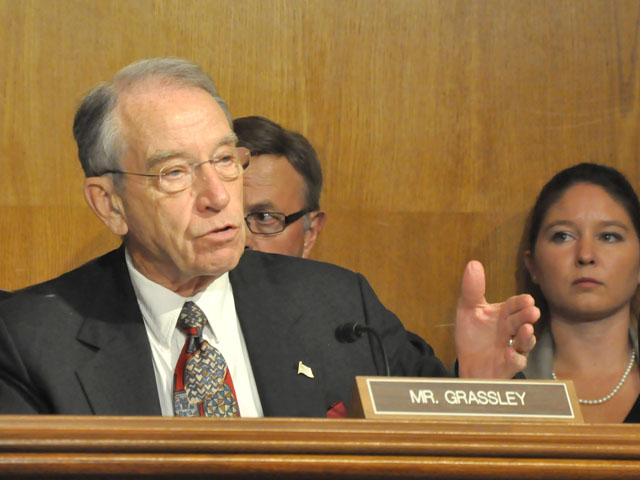Ag Policy Blog
Congress Looking Again at Cattle Markets, Comprehensively
Sen. Chuck Grassley, R-Iowa, will get a chance on Thursday to make his case that major reforms are needed to bring back fairness to cattle markets. Grassley will do that on the opposite side of Congress as he'll testify before the House Agriculture Committee.
House Agriculture Committee Chairman David Scott, D-Ga., asked Grassley to testify in the hearing Thursday to review the state of the livestock industry. Grassley acknowledged it is unusual for a sitting senator to come testify before a House hearing. Grassley and Sen. Jon Tester, D-Mont., have championed their bill which would require packers to buy 50% of their cattle from negotiated cash trade.
"I went to Chairman Scott, way back in June maybe, to talk about the need for the Grassley bill, on getting fair markets and a fair price for independent producers who negotiate," Grassley said. "You've heard me say it a few times, these four big corporations that have 85% of the slaughter of cattle practically rule out a market for those who want to negotiate on a daily basis rather than pre-contracting."
Grassley said he talked with Scott about the problems the packer purchase agreements were placing on Midwest producers.
After Grassley, Agriculture Secretary Tom Vilsack will testify. He will be followed by a panel of producers and a representative from the packers:
-Todd Wilkinson, Vice President, National Cattlemen's Beef Association, DeSmet. S.D.
-Francois Leger, owner, FPL Food, on behalf of the North American Meat Institute, Augusta, Ga.
-Scott Blubaugh, president, Oklahoma Farmers Union, on behalf of the National Farmers Union, Tonkawa. Okla.,
-Scott Hays, vice president, National Pork Producers Council, Monroe City, Mo.
-Brad Boner, vice president, American Sheep Industry Association, Glenrock, Wyo.
P[L1] D[0x0] M[300x250] OOP[F] ADUNIT[] T[]
A key focus of the hearing will likely examine how Congress should make changes to the Livestock Mandatory Price Reporting program, but also what other reforms may be needed to deal with industry concentration, the Packers & Stockyards Act, and USDA's programs to try to expand packer capacity through local and regional processors.
The Continuing Resolution passed by Congress last week extended the Livestock Mandatory Price Reporting program through Dec. 31, giving the House and Senate committees more time to pass a bill updating the five-year reauthorization of the law. Still, neither committee has marked up legislation to make permanent changes to the program.
Also leading up to Thursday's hearing, Texas A&M's Agricultural and Food Policy Center released a 180-plus page report on cattle markets stemming from a workshop held in early June in Kansas City, Mo. Dubbed as a comprehensive report, the report was requested at by the House Agriculture Committee and "puts into context a variety of disruptions in the cattle market."
The North American Meat Institute hailed the report as reflecting NAMI's view that the packing industry does not need any further government interference in its affairs because supply and demand have the biggest influence on cattle markets.
"The Texas A&M book went one step further and examined current legislative proposals and found these proposals' unintended consequences will harm those they are meant to protect: cattle producers," said Julie Anna Potts, president and CEO of NAMI. "This book should be required reading for Members of Congress who want to help livestock producers and consumers."
NAMI is opposed to bills such as one from Grassley and Tester, as well as a similar bill from Sen. Deb Fischer, R-Neb. NAMI cited a claim from Stephen Koontz, an agricultural economics professor at Colorado State University who mains that there were be a $2.5 billion negative impact in the first year of any requirement for packers to go out and buy more cattle on cash markets.
The report defends alternative marketing arrangements that lock in cattle supply for packers but in doing so also locks out the need for packers to seek cattle on the cash market.
"With respect to fed cattle pricing, research shows that alternative marketing arrangements do not create market power because they do not change underlying supply and demand fundamentals," the report stated.
The report also highlights, "Although not necessarily a popular position, most research confirms that the benefits to cattle producers due to economies of size in packing largely offsets costs associated with any market power exerted by the packers. Research indicated that there is market power, but its effect has been small.
And yet, for all of the economic statements in the A&M report, packer quarterly financial reports also offer a look at the market power of packers.
As of last week, all grades live cattle prices averaged $122.56 per cwt, about 12.5% higher than the same week a year ago. The Choice cut out that the packers are receiving was at $297.79 per cwt, coming in 26.8% higher than the same week a year ago, according to USDA reports.
The spread between what the packers are paying for cattle and what they are getting for beef also continues to show up in the quarterly reports for Tyson Foods and JBS USA.
Tyson reported in August that its third quarter results in the beef sector were $1.1 billion, a 22.6% operating margin for the quarter and 43% higher than the same quarter in 2020. The results were somewhat similar for the first nine months of the year with $2.09 billion in beef-sector profits, up 46.4% from the first nine months of 2020. At 22.6%, the beef sector was by far Tyson's most profitable sector, compared to 3.9% for pork and 6.5% for prepared foods.
For JBS USA, its quarterly report released in August showed $1.397 billion EBITDA (earnings before interest, taxes and depreciation) in its beef sector for the second quarter of 2021, up 162% from the first quarter, and 23.1% higher than a year ago. JBS USA's profit margin for its beef sector was 20.7% for the second quarter, nearly triple its pork profit margin and double the margin its poultry sector.
Cargill Inc. and National Beef, the two other major packers, are private companies and do not release financial figures.
Texas A&M's report: https://www.afpc.tamu.edu/…
Thursday's hearing will begin at 11 a.m. Central. You can watch it here: https://www.youtube.com/…
Chris Clayton can be reached at Chris.Clayton@dtn.com
Follow him on Twitter @ChrisClaytonDTN
(c) Copyright 2021 DTN, LLC. All rights reserved.






Comments
To comment, please Log In or Join our Community .